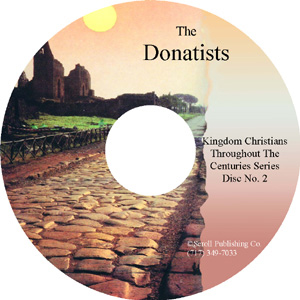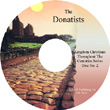
Donatists

North African Christianity tended to be uncompromising, ready to suffer imprisonment and martyrdom, and unafraid to take a stand against the rest of the Church when it felt that its side was right.
There were periods of persecution and peace during the entire period before Constantine's "conversion." One of the most severe and widespread persecutions–called the "Great Persecution" was under Diocletian in the years A. D. 303-305. Many Christians were imprisoned and martyred. Leaders were ordered to hand over all of the Christians Scriptures and writings to be burned. Those who did so, were called traditores (Latin: tradere, to hand over) by other Christians. Our English word, traitor, comes from the Latin traditor.
Among those who denounced these clergy were a group of confessors in prison in Carthage. ("Confessors" were Christians who confessed Christ before the authorities and who were imprisoned as a result.) In Carthage, the clergy had grown quite lax. Some of them were traditores; others sympathized with the traditores. Among this class were the bishop of Carthage and his archdeacon, named Caecilian. He bristled at the preaching and accusations made by the confessors, and he even prevented Christians from taking food into prison to the confessors.
When the persecution was over, these issues continued to brew. When the bishop of Carthage died in 311, Caecilian was hastily ordained as his successor by those in power. These were the more worldly ones, and they didn't represent the general will of the people. So the majority of the Christians in Carthage, acting in conjunction with the bishops from nearby Numidia, ordained their own bishop, Majorinus. Later, after Majorinus died, he was replaced as bishop of Carthage by a vigorous, outspoken leader named Donatus.
This is the origin of the group that were called "Donatists" by their opponents. Eventually, the Donatists found themselves in a face-to-face conflict with the catholic state church.
For a more detailed discussion of the origin of the Donatists and their history, we recommend the following CD about the Donatists, featuring David Bercot, editor of A Dictionary of Early Christian Beliefs.
CD: Donatists
$4.95
